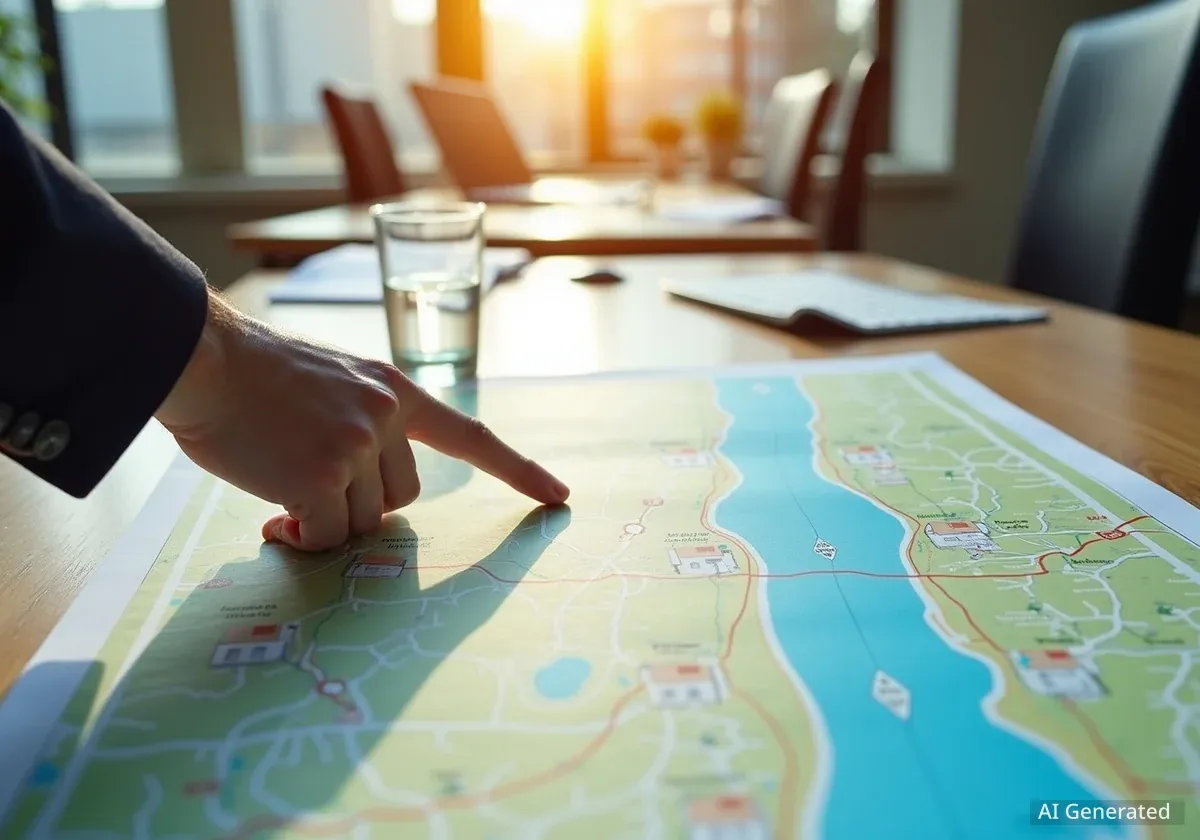A new initiative in Arizona is tackling a critical knowledge gap among real estate professionals, aiming to provide them with comprehensive education on the state's complex water issues. The program, developed by Arizona State University, seeks to empower agents to better advise homebuyers and sellers, particularly as water security becomes an increasingly vital part of property transactions.
The project, named REAL Water Arizona, is a partnership between ASU's Arizona Water Innovation Initiative and the Arizona Department of Real Estate. It addresses the challenges agents face when clients ask pointed questions about water rights, supply reliability, and costs, issues that can significantly influence a buyer's decision and confidence in their investment.
Key Takeaways
- Arizona State University has launched the REAL Water Arizona program to improve water education for the state's real estate agents.
- The initiative addresses a mandatory one-hour continuing education requirement on water that began in 2024 for license renewal.
- Research found that many existing courses lack depth and regional specificity, leaving agents unprepared for complex client questions.
- A new digital learning portal will offer at least two hours of in-depth, regionally-tailored water curricula to supplement the state's requirements.
Identifying an Educational Need
Every two years, real estate agents in Arizona must complete continuing education credits to maintain their licenses. Since 2024, this has included a mandatory one-hour segment on water, bundled with topics like deed fraud and fire safety. However, researchers leading the REAL Water Arizona project found that this brief overview is often insufficient.
Danielle Storey, a user experience researcher with the Arizona Water Innovation Initiative and a leader on the project, explained the core mission. "We want to know how Arizona real estate agents are understanding the water topics being taught to them and how they apply this knowledge to advising clients," she said.
To assess the situation, Storey's team observed 20 different continuing education courses across the state. Their findings revealed significant inconsistencies. While some instructors provided engaging and detailed lessons, many others offered only broad, statewide information that failed to address specific local concerns that buyers and sellers face.
From the Classroom to the Closing Table
The project went beyond simple observation. Researchers conducted over 20 interviews and held nine workshops in six different counties to hear directly from agents. These sessions were designed as conversations, not lectures, allowing agents to share real-world experiences.
"We wanted to go above and beyond what happens in the mandatory one-hour course and talk with agents about how water comes up in transactions and what kind of additional education would help them," Storey noted.
By the Numbers
Initial data from the project revealed that over 25% of real estate agents reported not feeling very confident when discussing complex topics like stream adjudications with their clients. Confidence was higher for more familiar subjects such as wells and septic systems.
Agents who voluntarily participated in the workshops expressed a strong desire for more knowledge. They frequently encounter client questions about groundwater reliability, the condition of wells, and long-term water quality, and often feel unprepared to provide confident, accurate answers.
Bridging the Knowledge Gap
The research highlighted a clear divide in concerns between urban and rural agents. Those in metropolitan areas like Phoenix and Tucson often work within regulated Active Management Areas (AMAs), which have plans for long-term water supplies. In contrast, agents in rural parts of the state deal with more uncertainty in unregulated zones where groundwater is the primary source.
Complex but crucial topics, such as the state's Assured and Adequate Water Supply program, were often misunderstood or avoided by both instructors and agents.
"Agents don’t usually speak in terms like ‘assured water.’ They might say ‘a hundred years of water,’ but they don’t necessarily understand the legal or programmatic context behind that."
This finding underscored the limitations of a single, one-hour mandatory course. To provide a more robust solution, the REAL Water team is developing a new digital learning portal. This platform will offer at least two additional hours of water-focused curricula designed for both residential and commercial real estate professionals.
What is an Active Management Area (AMA)?
Active Management Areas are five specific regions in Arizona with heavy reliance on groundwater. Within these AMAs, state law requires stringent water management plans, including the rule that new subdivisions must demonstrate a 100-year assured water supply before development can proceed. This regulation is a key part of Arizona's strategy to prevent groundwater depletion in its most populated areas.
A key feature of the new platform will be its adaptability. Instructors will be able to tailor content to their specific region, focusing on local water supply maps, regulations relevant to places like Prescott or the Verde Valley, and online tools from the Arizona Department of Water Resources.
Beyond Compliance to Build Confidence
The goal of REAL Water Arizona extends beyond simply helping agents fulfill a licensing requirement. It's about building genuine understanding and confidence, which in turn helps clients make better-informed decisions.
Harry Cooper, director of water conservation innovation at the initiative, emphasized the importance of conservation education—a topic not currently required by the state's course outline. "We know that understanding conservation at both the household and management-area levels can ease people’s worries about availability," Cooper stated. "If agents can connect those dots, they can help clients see that water security is something everyone contributes to."
Real estate agents are often the first point of contact for new residents and businesses moving to Arizona. Their ability to communicate accurately about the state's water management can have a significant impact.
"What they say, or don’t say, can make a huge difference to our regional economy and sustaining our culture of conservation," Cooper added.
A well-informed agent can also dispel common misconceptions, especially among out-of-state buyers who may have heard negative headlines about water in the West. By explaining the robust management plans within AMAs, agents can provide crucial context and reassurance.
A Collaborative Future
The project has been met with enthusiasm from the Arizona Department of Real Estate. Mandy Neat, the department's deputy commissioner, highlighted the importance of the partnership.
"Arizona has a special relationship with water, and just like sunshine and saguaros, it plays a big role in what makes a property tick — and what it’s worth," Neat said. "We are excited to be collaborating with ASU to ensure quality education to all real estate licensees."
The REAL Water team is set to present its full assessment report to the department this fall, followed by the development and launch of the digital learning portal. The initiative represents a proactive step toward ensuring that as Arizona grows, the professionals guiding its real estate market are equipped with the knowledge needed to navigate its most precious resource.





